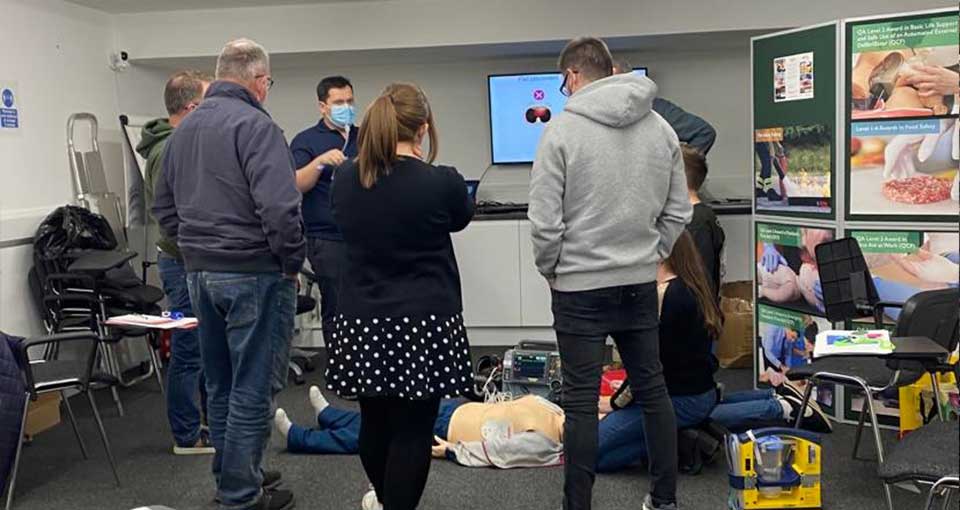First Aid Course
QA LEVEL 3 AWARD IN EMERGENCY PAEDIATRIC FIRST AID (RQF)
We offer this 1 day course as a private group of up to 12 learners. We can deliver this training at our centre or come to you at your place of work. This is priced at £600 inc VAT.
Please click on ‘Private Training’ to apply.
Overview

Would you know what to do if you saw a child in need of first aid? Having a good understanding of emergency paediatric first aid is incredibly important for the safety of children and it could mean the difference between life and death.
The QA Level 3 Award in Emergency Paediatric First Aid (RQF) qualification has been designed in-line with the current Early Years Foundation Stage (EYFS) requirements and is ideal for:
- Those who have gained a level 2 or 3 childcare qualification and have entered into an early years setting and wish to be included in the staff to child ratios to comply with the EYFS requirements.
- Anyone who cares for infants and children, such as parents, guardians, grandparents or those who have an involvement with infants and children and want to learn key paediatric first aid skills.
Successful candidates will learn the roles and responsibilities of the emergency paediatric first aider, and will be equipped with the skills needed to deal with a range of paediatric first aid situations, such as performing CPR and controlling external bleeding.
Course content
The roles and responsibilities of an emergency paediatric first aider:
- Assessing an emergency situation
- Dealing with an unresponsive infant or child
- CPR and defibrillation
- Recovery Position
- Choking
- Minor injuries
- Bites and stings
- Seizures
- External Bleeding
- Hypovolaemic shock
Assessment method
Qualsafe Awards has devised assessment tools to make sure Learners are assessed against the required knowledge, skills and understanding, as detailed in the learning outcomes and assessment criteria. For each unit there are:
Practical assessments – observed by the Trainer throughout the course, with the results of each learning outcome recorded on the practical assessment paperwork, see QA Guide to Assessing First Aid Qualifications.
There are 5 mandatory and 1 optional practical assessment for this qualification:
- Infant CPR and safe use of an AED
- Child CPR and safe use of an AED
- Choking casualty
- Paediatric wounds, bleeding and shock
- Unconscious casualty
- Catastrophic bleeding (optional extra)
Qualification Overview
This qualification forms part of the QA First Aid suite of qualifications. The qualification and learning outcomes are based on the recommendations of:
- The Resuscitation Council (UK)
- Early Years Foundation Stage (EYFS)
- A distinguished panel of experts in emergency medical care
This QA qualification is:
- For people who are required to provide emergency first aid to infants and/or children
- Based on the EYFS syllabus for emergency first aid courses Learners should be able to demonstrate the practical administration of safe, prompt, effective first aid in emergency situations with an understanding of the role of first aider.
This qualification specification provides information for Centres about the delivery of the QA Level 3 Award in Emergency Paediatric First Aid (RQF) and includes the unit information, assessment methods and quality assurance arrangements
Aim of Qualification
The objective of the qualification is to benefit Learners by preparing them to deal with a range of emergency first aid situations when looking after infants/children.
Intended Audience
This qualification is for anyone who cares for children and infants; including parents, guardians, grandparents or people who have a professional involvement with children and infants.
Entry Requirements
Learners must be at least 14 years old on the first day of the training and be able to perform practical tasks at floor level. There are no other formal entry requirements but we strongly recommend that Learners have a minimum of Level 1 in literacy and numeracy or equivalent
Requalification Requirements
This qualification is valid for a period of 3 years. The Learner needs to retake the qualification before the certificate expiry date to remain qualified.
IMPORTANT INFORMATION:
The training venue should be quiet and undisturbed. Staff should not be expected to be on duty. Staff attending should remain for the entire length of the session.
